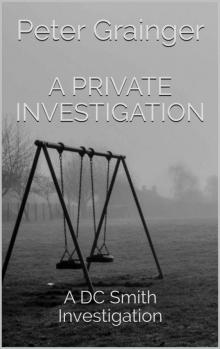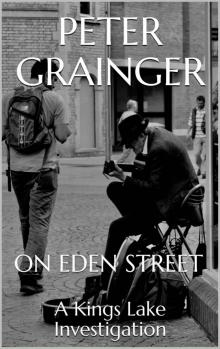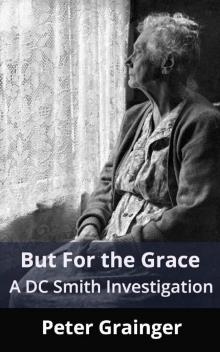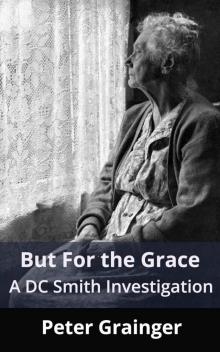- Home
- Peter Grainger
On Eden Street Page 2
On Eden Street Read online
Page 2
A silence had come after the initial greetings and introductions, and Greene occupied himself with sorting out the paperwork he had with him; he had the personnel folders of each member of the squad, the list of unresolved cases which they seemed to have inherited from other CID teams around the county, and he’d also taken the precaution of printing out some of the more important emails he’d received from DCI Freeman over the past few weeks. He was good with IT but not foolish enough to have complete faith in it. He opened the file of emails and checked they were in date order, aware that one person in the room was watching him – this was Detective Constable John Murray, a big, taciturn man whom Greene had met for the first time this morning. The detective inspector had read the files again over the weekend. Murray had a spotless record, and a few years ago had been shot while apprehending two Albanian kidnappers in the wilds of the Norfolk countryside. Being shot hadn’t stopped Murray. The records showed that after the injury he had shoulder-charged his way through a locked door and knocked down both men, one of whom was also armed with a knife, before assistance arrived. Subsequently, Murray had been awarded the Chief Constable’s Commendation for Bravery.
Greene looked up at the man and received a nod, that was all. The young woman seated beside Murray was from the same team at Kings Lake Central. Serena Butler’s record was not so straightforward, involving a horizontal move a couple of years ago, for personal reasons. She had been in line for promotion before that, and it wasn’t clear to Greene what had gone wrong. But since arriving in Lake there had been nothing but positive comments from her senior officers, including Detective Sergeant David Smith, and Greene noted that Butler had worked undercover in one investigation. That always requires a skill-set a little out of the ordinary. At present, however, she seemed to be pre-occupied with her iPhone.
Their detective sergeant, Chris Waters, Greene had met briefly almost a month ago, and they’d spoken a couple of times on the phone. Another protégé of David Smith, Waters was a graduate who had joined the Kings Lake Central force on the accelerated development scheme; by now he ought to have moved on to rarified pastures new and be wearing a sharp suit, not sitting here on a Monday morning in an open-necked shirt and wearing trousers that were suspiciously close to a pair of jeans. What had happened? Had he been thrown off accelerated development because he wasn’t making the grade? The fact that DCI Cara Freeman had personally recruited him, as she had every other officer in the room, suggested that might not be the case.
Greene looked up and about again, making a point of not staring but that wasn’t necessary, because Waters was – staring absent-mindedly out of the room’s solitary window. Tall, thin and fair-haired, the detective sergeant wouldn’t be picked out by most villains who had an eye for a copper but his clear-up rate was phenomenal; every single case upon which he’d worked since arriving at Central had resulted in charges, and almost all of them in convictions. Of course, the files didn’t tell you how much of that was down to Waters personally.
The other three members of the new team Greene had met for the first time this morning, though he had spoken to his other sergeant, Denise Sterling, on the phone last week. She had worked in Great Yarmouth for several years, and he knew that by East Anglian standards, that wasn’t an easy town to police. She’s thirty-six, divorced with two children, ten and eight years old. Looking to relocate thanks to this job – she’d said on the phone she was aiming to find better schools for her kids. Fair enough, Greene thought, but a single parent taking on a demanding role in a squad that was sure to be subject to a lot of scrutiny and pressure?
He looked at her, nodded and got the same in return. Blue eyes, blonde hair pulled severely back into a ponytail, and a build that suggested she was more track than field. Well, he concluded for now, she’ll need to be as tough as she looks.
Next to the sergeant was Clive Betts – thirty-five, has worked in Norwich as a detective constable for several years. He lives in Dereham, so his daily drive is about the same as mine, thought Greene. Where the members of your team live can matter operationally, and they seemed to have a reasonable spread across the western half on the county. Betts was smartly dressed, wearing a suit like Greene, and the detective inspector wondered whether, like himself, this was only because it was day one and better to be safe than sorry. Freeman hadn’t yet laid down any ground rules about these matters.
One could not help wondering how she had selected the people in the room, though. Betts’ file gave a few clues. Several case reports mentioned his tenacity and his willingness to go the extra mile – that would count with Freeman. So would the fact that Betts was firearms trained to the highest level and he was also a qualified high-speed pursuit driver. With specialist support so scarce now, it was handy to have your own Jason Bourne around. But Greene couldn’t stop his eye going back to the same place in Betts’ folder that it had gone every time he looked at it, as if he still couldn’t quite be sure he’d read it properly. Next of kin: Jack Betts; relationship: civil partner. Now, obviously, some ladies call themselves “Jack” but all Greene’s instincts were telling him that wasn’t the case here. Did Freeman have a diversity agenda – or had she had one imposed upon her?
Because the last member of the team was a shy, silently pretty girl of mixed race descent. Greene wasn’t sure whether she had Indian blood or something from further to the east – her surname suggested the former but her skin colour was pale. Around the eyes she seemed to have a touch of the orient, but had she applied make-up to create the effect? She was a girl easy to gaze at, and so Tom Greene made a point of looking at his watch – Freeman was ten minutes late now, not a good beginning – before he turned over the first page of the girl’s file. Maya Kumar; twenty-three; graduate with first class honours in philosophy from the University of Sussex. Philosophy? Greene put that to one side for a moment and checked something else. Before one can apply to the Criminal Investigation Department, two years in uniformed service must be completed, and she was only twenty-three.
He checked her date of birth and the dates on which she had interviewed for and been recruited by the police service. She’d done her first year in Suffolk – her family, Greene noted, lived near Bury St Edmunds – and then had transferred to Norfolk. But the address in her file was still her home address. Was she planning to drive here every day? Greene double-checked the dates and discovered that Freeman had brought the young woman into the murder squad less than three months after she had completed her uniform service. And for the life of him, he could see nothing in her file to explain why.
There were clever and experienced people in the room, and some of them might be wondering the same about the detective inspector – he was well aware of that. But Greene knew why he was there. He’d met Freeman whilst giving evidence in a murder case last year, at Lincoln Crown Court; Freeman hadn’t been the senior investigating officer but she advised on an aspect of the evidence chain which the defence were challenging. During the three-week trial, she had watched him giving evidence under heavy fire, and then she’d engaged him in conversation in the nearby café they were using at lunchtimes. You’ve done this before, she said; tell me about some of your other cases, and he did. And then, out of the blue, four months ago, she had called him on his personal mobile – he realised later that they had never exchanged numbers – and asked whether, if she was setting up a new squad in west Norfolk, he would consider being her second-in-command. Just like that. It’s not how things are usually done. You see posts advertised internally, you go through the process. Those in charge don’t ring you up at home and say do you want to be in my gang, but Freeman had.
He’d spent the weekend talking it over with Jill, making sure he understood exactly what it was Freeman would want from him. On the Friday, he had also used a few of his own contacts to make some discreet inquiries about the DCI who wanted to disrupt his quiet, comfortable life running a team of detectives from Thorpe Wood in Peterborough. The results of those inquiries ranged from �
��Ambitious doesn’t quite cover it” to “Tom, never get involved with a younger woman”, and from “She’d sell her own mother for an interview for detective superintendent” to “Total fruit and nut-case”. Freeman was unconventional, and that’s why she wanted him, because he was not – Greene knew he was viewed as conventional but in a very methodical and considered way. She was looking for a sheet anchor.
Outside, there were voices – no, just one voice, someone talking on a mobile phone. He recognised Freeman, and Greene’s eyes went to the door and watched along with everyone else’s. Like being at school, waiting for a new teacher – it felt important.
Then she was inside, putting the phone into a briefcase, a slight figure who looked more school-girlish than anyone else in the room apart from Miss Kumar. Greene noted the smart, business-like white blouse above an incongruous pair of blue denim jeans, as if the DCI herself had been in two minds about how to dress for the occasion.
She sat down in the seat Greene had left for her when he pushed the tables together – then she looked around the room, meeting each pair of eyes one by one.
‘I’m not normally late, so please don’t mis-read our start this morning. Meetings and briefings begin on time, and we don’t wait for anyone. I was on time until… Well, there’s been a development. I’ll come to that shortly. First things first.’
Christopher Waters couldn’t make it out. His new DI, Thomas Greene, appeared to be making notes as Cara Freeman talked, but it was just scribbles on the notepad. Maybe he’s a doodler, some people are. And then the penny dropped – Greene was writing in shorthand. Waters had seen this once before. A fellow student at the university had learned it and took lecture notes that way; the same person also had the best notes and was much in demand towards the end of each term when assessment papers were written. He wondered whether this was part of Greene’s job description, too – if so, he must be the highest paid secretary north of Newham.
Freeman covered ground quickly, and having worked with her on the Graham Fletcher case, Waters had expected that. She talked about the rooms they had available as a new squad – this one for briefings, the two adjacent offices and they had first call on Interview 1. She ran through the structure of their basic forty-hour week but there could be no-one in the room who didn’t understand that working for Freeman on murder cases would make a nonsense of that, more often than not. Dress code – informal in the office and on routine inquiries, but smart casual to very smart when dealing with the public in formal situations and when giving evidence in court. Communications: ‘If it’s one of the squad, respond promptly, every time, even if it’s only a text saying you’ll call back. Tom will be running the desk on our investigations. Dates, times, names, anything and everything factually significant needs to go into emails to Tom. He’ll get it sorted into the databases.’
Waters could see this had all been agreed in advance – Greene glanced around, but showed no surprise at what Freeman was saying. Waters was a little surprised, though. Detective Inspectors don’t run desks unless it’s a major investigation, the sort that involves scores of CID staff. Usually an experienced sergeant will take on the job, as Wilson had with the investigation into the murder of Michelle Simms. This might be connected to the other thing that had been troubling him since he sat down here and realised they were only waiting for Freeman. According to what she had told him that day in Luton, they were two people short – she had said one DI, two detective sergeants, each running three detective constables. There were only four DCs in the room, and then he found himself smiling at the thought.
Freeman said, ‘Moving on. Command structures. As far as this squad is concerned, I report to Commander Harry Alexander. Some of you will know he’s head of the Regional Serious Crimes Unit. It gets complicated after that because I’m also looking after Kings Lake Central CID in the absence of Alison Reeve, and so my other boss is Detective Chief Superintendent Allen.’
She looked at the three of them, Waters, Serena Butler and John Murray, but nobody blinked. Freeman smiled briefly anyway, and said, ‘I spoke to Alison on Friday, and she’s doing well. She sends her love.’
Waters hadn’t seen Alison Reeve since she left the building several weeks ago, and he reproached himself for that. He knew that Smith had been to visit her. In a telephone conversation, Smith had told him she was in good spirits but showing signs of the treatment she was undergoing – tired, losing some weight that she could ill-afford, losing some of her hair. For a woman, that must be traumatic, he thought. He didn’t want to embarrass her. Maybe if he rang first…
‘… you will be wondering where the rest of us are. The fact is, we’re already breaking records. This squad is the first in the history of the police service to suffer redundancies before the unfortunate employees were even appointed. We’re two DCs short on the original plan. There was no point in me making a do-or-die charge over this, and I’m sure someone here has already worked out what this squad will cost per annum, even in its reduced state.’
Waters hadn’t but took up the challenge as he listened to Freeman.
‘So, the way we’ll deal with it is by proving what an effective unit we are. That’s going to be the best justification for winning back those two detective constables. It does, of course, have certain implications on a day-to-day basis. We’re all used to operating in pairs, and you’ll continue to do so whenever it’s practical, but there will be times when you’re on your own, and there will be times when you’re working with someone different – me or the detective inspector or the other sergeant on the team. We need maximum flexibility and there isn’t going to be time or space for team rivalries. We are a single, specialist unit. Is everyone OK with what I’ve just said?’
Again, the look around the room, catching every eye, and she wanted an acknowledgement this time. Serena, who had worked with Freeman more than anyone else present, said ‘Ma’am,’ followed by Greene and Denise Sterling. After a pause, Maya Kumar said the same and Waters caught the accent – received pronunciation, upper class.
Freeman was looking at Waters now. He nodded clearly, and Clive Betts followed suit. Murray was left. The detective chief inspector smiled encouragingly enough but she wouldn’t let it go, and Waters sensed danger. Murray hadn’t agreed to join the new squad as easily or as positively as Waters had first hoped. There had been a couple of phone calls outside work and a meeting in the pub nearest to Murray’s home. It couldn’t be loyalty to DI Terek; Murray wasn’t one to air his opinions of others but Waters knew him well by now, and Murray had no time for jobsworths. Perhaps Murray thought that leaving their old office was too much of a break with the years he had worked there under Smith – perhaps even that Waters was betraying the old team instead of standing and fighting. In the end, though it was never openly stated, Waters guessed it was Murray’s devotion to Maggie and their three-year-old son that was standing in the way. Murray didn’t need longer hours and new challenges in his career – he had other priorities.
The silence had gone on too long, and Waters felt the pressure to intervene, knowing that if he did so, someone would end up looking foolish. And then Murray gave a single brief nod to Cara Freeman and it was done.
Detective Inspector Greene opened one of several folders in front of him on the table and took out prepared packs of information, one for each of the team, their names already printed at the top. The first page was a list of their contact details, and as they studied the packs, Freeman asked them to put each other’s mobile numbers and work email addresses into their phones and devices before leaving the room. The bulk of the information, however, consisted of a set of summarised case files, and Freeman explained.
‘We might be a new squad but we’re not baggage free. These are open cases – murders – which we might find ourselves reviewing if love and peace break out in the county. They’re not to be called “cold cases” apparently, even though some of them might look like something sad that’s been found at the bottom of someone’s fr
eezer when it needed de-frosting. Browse through and you might find one or two that you remember. I’m expecting everyone to get themselves up to speed on these cases as soon as possible – it’s gripping bedtime reading.’
Waters flicked through, not reading but examining the lay-out and presentation. It was uniform for every case, which meant this had not been photocopied from existing files or downloaded from various local databases; someone had spent a lot of time summarising and re-ordering the material into one consistent format. Freeman had administrative support downstairs but this had been done by an ordered and experienced mind. His money was on Tom Greene, and he glanced up at the man again. A dark grey suit, not new, a white shirt and a plain blue tie, and conservative, black leather shoes – again not new but clean and probably polished by hand. The detective inspector was getting ready the next set of hand-outs – he must have been at this for days before this meeting. Reading upside down, Waters could see they were about to be given the Home Office Homicide Index and Review for 2018. “Know the odds”, Smith used to say – “Always begin with the numbers”. No wonder Freeman tried so hard to get him through that door.
‘And finally,’ she said, ‘we’re back in the moment. Fifteen minutes before the start of this meeting, as I was about to leave the main office down below, DI Terek directed my attention to the work-screen for the day. At around 08.30 this morning, a couple of PCSOs reported finding a body in a shop doorway. In Kingsgate?’
She looked at the Kings Lake detectives and all three nodded.

 Persons of Interest
Persons of Interest A Private Investigation
A Private Investigation Songbird
Songbird On Eden Street
On Eden Street An Accidental Death
An Accidental Death Time and Tide
Time and Tide An Accidental Death: A DC Smith Investigation
An Accidental Death: A DC Smith Investigation In This Bright Future
In This Bright Future Lane: A Case For Willows And Lane
Lane: A Case For Willows And Lane The Rags of Time: A DC Smith Investigation
The Rags of Time: A DC Smith Investigation Luck and Judgement
Luck and Judgement Persons of Interest: A DC Smith Investigation
Persons of Interest: A DC Smith Investigation Lane
Lane But For The Grace
But For The Grace Time and Tide: A DC Smith Investigation
Time and Tide: A DC Smith Investigation In This Bright Future: A DC Smith Investigation
In This Bright Future: A DC Smith Investigation The Rags of Time
The Rags of Time But For The Grace: A DC Smith Investigation
But For The Grace: A DC Smith Investigation Luck and Judgement: A DC Smith Investigation
Luck and Judgement: A DC Smith Investigation